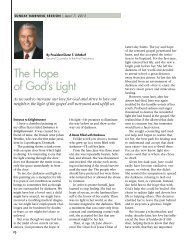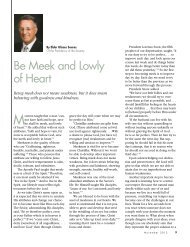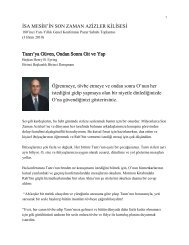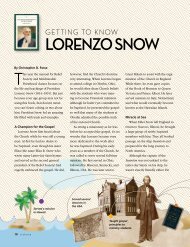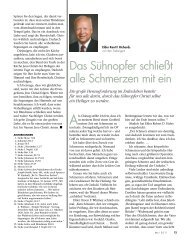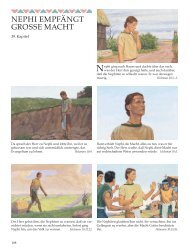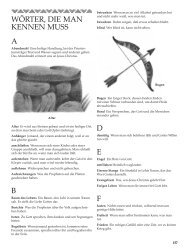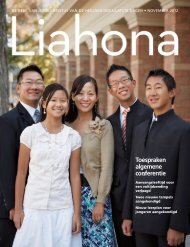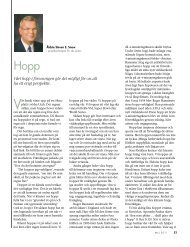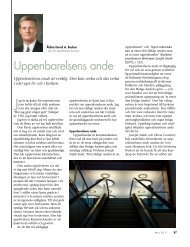December 2004 Ensign - The Church of Jesus Christ of Latter-day ...
December 2004 Ensign - The Church of Jesus Christ of Latter-day ...
December 2004 Ensign - The Church of Jesus Christ of Latter-day ...
You also want an ePaper? Increase the reach of your titles
YUMPU automatically turns print PDFs into web optimized ePapers that Google loves.
24<br />
prayed that each <strong>of</strong> my children would have an experience<br />
by which they might know the reality <strong>of</strong> their Eternal<br />
Father’s love. <strong>The</strong> answers have come in different ways for<br />
each child, but there is a similarity in the life-changing<br />
power that these experiences produce. As children continue<br />
to call upon their Father, a confident humility, born <strong>of</strong><br />
a sense <strong>of</strong> their kinship with Deity, begins to grow in them.<br />
<strong>The</strong>y are kinder to one another as they see how God has<br />
been kind to them. <strong>The</strong>y are more willing to seek out and<br />
follow His counsel, knowing it will come.<br />
I have noticed my children more<br />
drawn to the truths <strong>of</strong> the scriptures,<br />
sensing that many answers to present<br />
and future prayers are recorded there.<br />
<strong>The</strong> things <strong>of</strong> the world seem to appear<br />
less attractive to them, dimmed by the<br />
light <strong>of</strong> the reality <strong>of</strong> a personal God<br />
who is aware <strong>of</strong> them. Moses experienced<br />
this life-transforming reality<br />
when the Lord spoke to him face-t<strong>of</strong>ace,<br />
calling him “my son” (Moses 1:6).<br />
When Lucifer later tempted the prophet, he replied, “I will<br />
not cease to call upon God, I have other things to inquire<br />
<strong>of</strong> him: for his glory has been upon me, wherefore I can<br />
judge between him and thee. Depart hence, Satan” (Moses<br />
1:18).<br />
When we are recipients <strong>of</strong> anyone’s compassion, especially<br />
that <strong>of</strong> our Heavenly Father, we experience a refinement<br />
and s<strong>of</strong>tening <strong>of</strong> our character. In the first chapter <strong>of</strong><br />
Ether, the brother <strong>of</strong> Jared <strong>of</strong>fered three recorded prayers,<br />
each <strong>of</strong> which was granted. In every case we read that the<br />
Lord “had compassion” (Ether 1:35, 37, 40) upon Jared<br />
and his family or friends. It is critical as we seek our Father<br />
in Heaven that we understand that we address a being<br />
who is filled with compassion.<br />
Taking Time to Ponder<br />
Before he went into the Sacred Grove, the Prophet<br />
Joseph Smith’s “mind was called up to serious reflection”<br />
(Joseph Smith—History 1:8). I believe our Heavenly Father<br />
Before he went into<br />
the Sacred Grove, the<br />
Prophet Joseph Smith’s<br />
“mind was called up to serious<br />
reflection.” I believe our<br />
Heavenly Father anticipates that<br />
we will reflect seriously about<br />
the concerns we bring to him.<br />
anticipates that we will reflect seriously about the concerns<br />
we bring to Him. This lesson was taught to the brother <strong>of</strong><br />
Jared when the Lord asked him to ponder the problem <strong>of</strong><br />
light in the barges (see Ether 2:22–25; 3:1–6; 6:2–3).<br />
Sometimes when I pray, I can imagine the Lord saying,<br />
“What do you think about the matter?” <strong>The</strong>re is something<br />
very humbling in knowing He really does care what we<br />
think. Perhaps this is what Alma meant when he taught his<br />
son Helaman to “counsel with the Lord in all thy doings,<br />
and he will direct thee for good” (Alma 37:37; emphasis<br />
added). Serious reflection allows me<br />
to bring something to our counseling<br />
session when I approach my Father<br />
in prayer.<br />
<strong>The</strong> Prophet Joseph Smith also indicated<br />
that his feelings “were deep and<br />
<strong>of</strong>ten poignant” (Joseph Smith—<br />
History 1:8). I am impressed by the<br />
word deep. It is used elsewhere in the<br />
scriptures to describe a certain hunger<br />
for communication with God. Enos<br />
said that “the words . . . concerning eternal life, and the<br />
joy <strong>of</strong> the saints, sunk deep into my heart.<br />
“And my soul hungered; and I kneeled down before my<br />
Maker” (Enos 1:3–4; emphasis added).<br />
<strong>The</strong> Prophet Joseph Smith tells us that when he knelt<br />
down in the Sacred Grove he “began to <strong>of</strong>fer up the desires<br />
<strong>of</strong> [his] heart to God” (Joseph Smith—History 1:15). <strong>The</strong> 12<br />
chosen Nephite disciples “did not multiply many words, . . .<br />
and they were filled with desire” (3 Nephi 19:24). Speaking<br />
to the Lord, the brother <strong>of</strong> Jared observed “that from thee<br />
we may receive according to our desires” (Ether 3:2). We<br />
sing “prayer is the soul’s sincere desire” (Hymns, no. 145).<br />
It seems almost self-evident that we should <strong>of</strong>fer God our<br />
desires, but occasionally, for various reasons, we may find<br />
ourselves hesitating to express our deepest feelings.<br />
Trusting in the Lord’s Wisdom<br />
Of course, not all <strong>of</strong> our petitions are granted, for we<br />
also address a God <strong>of</strong> wisdom. <strong>Jesus</strong> introduced the Lord’s



